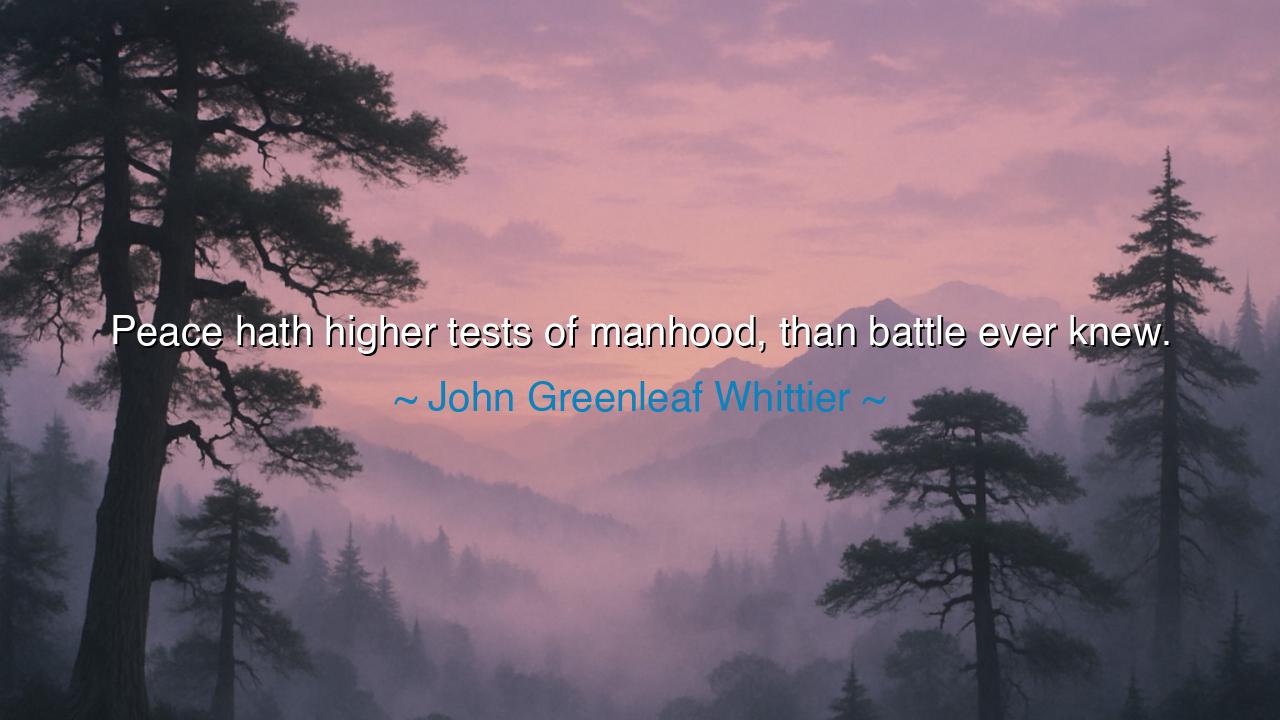
Peace hath higher tests of manhood, than battle ever knew.






Hear the noble words of John Greenleaf Whittier, poet and prophet of conscience, who declared: “Peace hath higher tests of manhood, than battle ever knew.” These words strike like a bell through the centuries, reminding us that while the roar of cannons and the clash of swords may seem to define courage, there is a greater and more difficult strength: the strength required to live in peace. For war is loud and fleeting, but peace demands patience, sacrifice, humility, and the quiet heroism of the soul.
Mark this, O listener: men have long exalted the warrior, crowning him with laurel, singing of his valor, praising his wounds. Yet Whittier, with wisdom deeper than the noise of battle, points to another truth. To fight may require courage of the body, but to keep peace requires courage of the spirit. It is easier to charge with fury into the fray than to forgive an enemy. It is easier to strike in anger than to endure insult with dignity. War tests the body for an hour; peace tests the heart for a lifetime.
Consider the example of Abraham Lincoln, who, at the close of the American Civil War, stood not as a conqueror over the South, but as a healer of a broken nation. His words, “With malice toward none, with charity for all,” revealed a greater courage than any general on the battlefield. For he knew that vengeance was easy, but reconciliation demanded far greater strength. Lincoln’s call to mercy was the true test of manhood, a test far higher than victory in battle. His vision echoes Whittier’s truth: that the building of peace is a nobler struggle than the destruction of war.
Or look to the life of Nelson Mandela, who emerged after twenty-seven years in prison. He could have called for blood, for revenge against his oppressors. Yet instead, he extended the hand of forgiveness. He chose dialogue over retribution, unity over division. His courage was not to slay enemies, but to transform them into allies. This was no weakness—it was the highest strength. Mandela passed the higher test of peace, showing the world that true greatness lies not in the might of one’s fist, but in the power of one’s spirit to reconcile.
But let us not think this lesson belongs only to rulers and giants of history. The truth of Whittier’s words touches every life. In the home, it is easier to shout than to listen. In the workplace, easier to quarrel than to compromise. In the community, easier to divide than to heal. Yet each time we choose patience over rage, understanding over judgment, forgiveness over resentment, we take the harder road, and in so doing, prove the nobler strength. The true warrior is the one who makes peace in daily life.
Whittier’s words burn also with warning: the world often mistakes violence for manhood, but this is a shallow illusion. He reminds us that true manhood—indeed, true humanity—must be measured by higher standards. Can you master yourself when provoked? Can you resist hatred when wronged? Can you build bridges where others demand walls? These are the higher tests, unseen by the crowd, but eternal in their worth. To pass them is to join the company of those whose strength outlasts armies and whose names endure beyond battles.
The lesson is clear, O children of the future: do not be deceived by the false glory of strife. Seek instead the higher glory of peace. Train your heart in patience, discipline your tongue in kindness, school your hands in the work of reconciliation. Be willing to endure the long road of peace, for it demands more than war ever did. For as Whittier proclaimed, peace is the higher test, and those who pass it are the true heroes of humanity.
Therefore, let these words guide you always: strive not merely to be brave in conflict, but to be steadfast in peace. For the battlefield fades, but the fruits of peace endure. And when your children look back upon your life, let them say not only that you fought, but that you forgave, not only that you were strong, but that you were wise. This is the higher manhood, the higher womanhood, the higher humanity: to labor, to suffer, and to triumph for peace.






AAdministratorAdministrator
Welcome, honored guests. Please leave a comment, we will respond soon